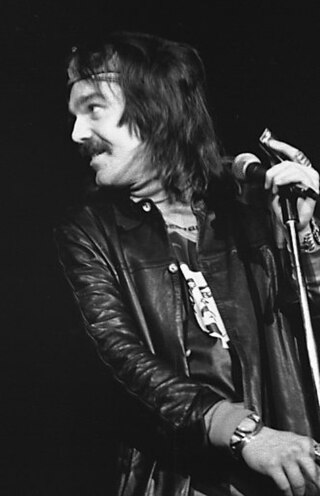
Don Van Vliet was an American singer, songwriter, multi-instrumentalist, and visual artist best known by the stage name Captain Beefheart. Conducting a rotating ensemble known as the Magic Band, he recorded 13 studio albums between 1967 and 1982. His music blended elements of blues, free jazz, rock, and avant-garde composition with idiosyncratic rhythms, absurdist wordplay, a gravelly voice, and a wide vocal range. Renowned as an enigmatic persona, Beefheart frequently constructed myths about his life and was known to exercise an almost dictatorial control over his supporting musicians. Although he achieved little commercial success, he sustained a cult following as an influence on an array of experimental rock and punk-era artists.

Ryland Peter Cooder is an American musician, songwriter, film score composer, record producer, and writer. He is a multi-instrumentalist but is best known for his slide guitar work, his interest in traditional music, and his collaborations with traditional musicians from many countries.
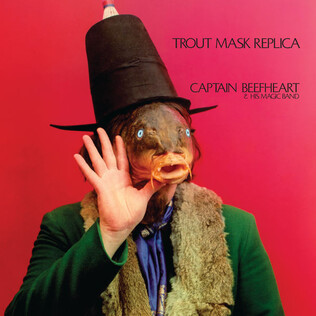
Trout Mask Replica is the third studio album by the American band Captain Beefheart and his Magic Band, released as a double album on June 16, 1969, by Straight Records. The music was composed by Captain Beefheart and arranged by drummer John "Drumbo" French. Combining elements of R&B, garage rock, and blues with free jazz and avant-garde composition, the album is regarded as an important work of experimental rock. Its unconventional musical style, which includes polyrhythm, multi-octave vocals, and polytonality, has given the album a reputation as one of the most challenging recordings in the 20th century musical canon.

"Good Vibrations" is a song by the American rock band the Beach Boys that was composed by Brian Wilson with lyrics by Mike Love. It was released as a single on October 10, 1966, and was an immediate critical and commercial hit, topping record charts in several countries including the United States and the United Kingdom. Characterized by its complex soundscapes, episodic structure and subversions of pop music formula, it was at the time the most expensive single ever recorded. "Good Vibrations" later became widely acclaimed as one of the finest and most important works of the rock era.

John Stephen French is an American drummer and former member of Captain Beefheart's Magic Band, where he was known by the nickname Drumbo. He was the principal drummer on several of Beefheart's albums, including 1969's Trout Mask Replica, for which he also acted as arranger. He later released several albums as a solo artist as well as with the collaborative group French Frith Kaiser Thompson.
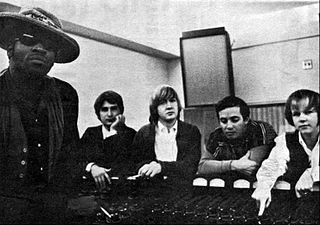
Rising Sons was an American folk-rock band formed in Los Angeles in 1965. Their initial career was short-lived, but the group found retrospective fame for launching the careers of singer Taj Mahal and guitarist Ry Cooder.

Lick My Decals Off, Baby is the fourth studio album by American musician Captain Beefheart and the Magic Band, released in December 1970 by Straight and Reprise Records. The follow-up to Trout Mask Replica (1969), it is regarded by some critics and listeners as superior, and was Van Vliet's own favorite of his albums. In his words, the title credo of the album was an encouragement to "get rid of the labels", and to evaluate things according to their merits.

Strictly Personal is the second album by Captain Beefheart and his Magic Band. It was originally released in October 1968 as the first album on the Blue Thumb Records label. It was released nearly a year after the band had taken to the studio to record the follow-up to 1967's Safe as Milk, and was composed primarily of material intended for an aborted double-LP entitled It Comes to You in a Plain Brown Wrapper.

Safe as Milk is the debut studio album by American music group Captain Beefheart and his Magic Band, released in June 1967 by Buddah Records. A heavily blues-influenced work, the album features a 20-year-old Ry Cooder, who played guitar and wrote some of the arrangements.

Mirror Man is the fifth studio album by American band Captain Beefheart and his Magic Band, released in April 1971 by Buddah Records. It contains material that was recorded for the label in 1967 and originally intended for release as part of an abandoned project entitled It Comes to You in a Plain Brown Wrapper. Much of the material from this project was subsequently re-recorded and released through a different label as Strictly Personal (1968). The tapes from the original sessions, however, remained under the care of Buddah, who took four of the unissued tunes and released them as Mirror Man. The album sleeve features an erroneous claim that it had been "recorded one night in Los Angeles in 1965".

Shiny Beast (Bat Chain Puller) is the tenth studio album by American band Captain Beefheart and the Magic Band, released in October 1978 by Warner Bros. Records. The album emerged from production difficulties surrounding Bat Chain Puller, an album Captain Beefheart recorded for DiscReet and Virgin Records in 1976. DiscReet co-founders Herb Cohen and Frank Zappa feuded over the production of the album, because Cohen funded the production with Zappa's royalty checks. Captain Beefheart recorded a new album titled Shiny Beast (Bat Chain Puller) after Zappa withheld the master tapes of the original Bat Chain Puller album.

The Magic Band was the backing band of American singer, songwriter and multi-instrumentalist Captain Beefheart between 1967 and 1982. Originally Beefheart had simply been the lead singer of the group, formed by guitarist Alex St. Clair, but eventually they morphed into a backing band for him. The rotating lineup featured dozens of performers, many of whom became known by nicknames given to them by Beefheart. Longtime members during the band's heyday included drummer/arranger John French, guitarist Bill Harkleroad, bassist/guitarist Mark Boston, percussionist/keyboardist Art Tripp, guitarist Jeff Cotton, and guitarist Elliot Ingber. Ex-members of the Magic Band formed the short-lived group Mallard in 1974. The Magic Band reformed in 2003, without Beefheart with artists like guitarist and bassist Eric Klerks.
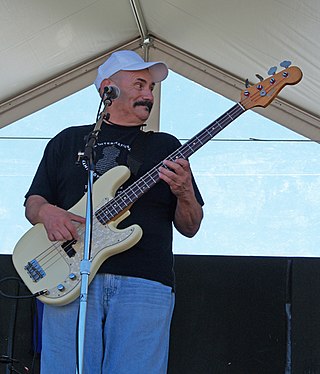
Roy Estrada is an American former musician. He is best known for being the original bassist of both the Mothers of Invention and Little Feat. He was also later a member of Captain Beefheart's the Magic Band and occasionally still worked with Frank Zappa in Zappa's solo career following the Mothers' split.
Alex St. Clair was an American musician.

Fast 'n' Bulbous – A Tribute to Captain Beefheart is an album released by Imaginary Records in the UK in 1988, consisting of contemporary artists performing cover versions of songs by Captain Beefheart.
Gary "Magic" Marker was an American bass guitarist and recording engineer, best known for his involvement in various psychedelic rock bands of the 1960s.

The following is a list of official releases by American musician Captain Beefheart. With various line-ups of musicians called The Magic Band, Beefheart released a total of 13 studio albums recorded between 1967 and 1982, after which he left music to concentrate on a career in painting, as Don Van Vliet. His catalogue has since been augmented with extra releases including an EP and various compilations of live material, studio outtakes and greatest hits releases.

I'm Going to Do What I Wanna Do is a live album from Captain Beefheart and the Magic Band. In support of the US release of his album Shiny Beast , Beefheart and the band undertook a promotional club tour. On Saturday 18 November 1978 they performed at My Father's Place in Roslyn, New York. My Father's Place was located under a motorway bridge, held about 200 people and the patrons sat at long tables and could dine whilst listening if they wished. The show was recorded and mixed directly to two-track tape. The tape was used for a radio broadcast on WLIR-FM on 11 December 1978. Following a limited release on CD, Rhino Records made the tracks available for download. In April 2023, Rhino released the concert on a double vinyl LP, limited to 5000, for Record Store Day.
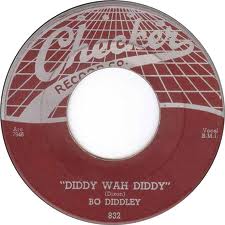
"Diddy Wah Diddy" is a song written by Willie Dixon and Ellas McDaniel, known as Bo Diddley, and recorded by the latter in 1956. The song shares only its title with Blind Blake's song "Diddie Wah Diddie" recorded in 1929. Over the years, the Bo Diddley song has been covered by many bands and artists, including the Astronauts, Captain Beefheart and his Magic Band, the Remains, the Twilights, Taj Mahal, the Sonics, the Fabulous Thunderbirds, Ty Segall Band, and the Blues Band among others.
Herb Bermann is an American lyricist, screenwriter, and actor. He is best known for co-writing the 1967 debut album Safe as Milk for Captain Beefheart and His Magic Band. The second album Strictly Personal featured four of Bermann's songs, though he was uncredited: "Safe As Milk", "Trust Us," "Gimme Dat Harp Boy," and "Kandy Korn"

















